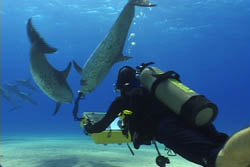Joelle (Jeff's wife) and I did some diving in Grenada. The reef was full of life and they recently designated several of them as protected areas off limits for any fishing. But I will tell you I think I was spoiled by our diving in the Bahamas (BlueVoice trip off Bimini, summer, 2010). Perhaps it was from the rain every night kicking up sand, but the visibility was much better in the Bahamas. Less blue and more green in Grenada.
I was also happy to see that in the Tobago Cays national park they have patrols out making sure no one is fishing and no one is taking turtles. I had a great encounter with a Hawksbill turtle who let me follow him for a few minutes, until I was worn out – they can really move.
http://www.youtube.com/watch?v=g2qeaxiaFeY
And we had a ton of fun on the ship:
http://www.youtube.com/watch?v=okvuLJwLFIQ
Some thoughts on whaling down there… Grenada, which has voted with Japan, seems to be getting a ton of foreign aid now from China. I did not take the island tour, but my shipmates did and said there are projects going on all over the island courtesy of China. I’m not sure why – perhaps because Grenada is so close to Venezuela, and China wants oil from there. But China’s money may reduce the importance of Japan’s contributions. Grenada doesn’t hunt whales or dolphins as far as I know, so their vote is purely financial.
I spoke to some people on Bequia about their humpback quota. Most of the islands that are part of St Vincent and the Grenadines, including Bequia, are very primitive. The hunt from Bequia is definitely old school, with small boats and hand held harpoons, which explains why they do not have successful hunts every year. I believe their quota is 2 per year. The people there that I spoke with believe their hunting will die out as it is done by older people on the island. The younger generation seems to have no interest and they don’t seem concerned about keeping it going as a tradition. I got the sense that it is a subsistence hunt and they don’t really care about preserving it. The people on the island are incredibly kind and friendly. It left me feeling that although I am totally opposed to their hunt, Japan and Greenland are a much more concerning issue right now.
I also think change is coming down there. The seeds for development and tourism are evident. And right now the government of St Vincent & The Grenadines is very friendly with Chavez and Castro. But the locals see the opposition party winning the next elections in 2011 and the opposition party is friendly to conservation, tourism and wants US dollars there. That might present some opportunities to swing their vote away from Japan (at the IWC).
I met an interesting guy on Bequia named Brother King. He started a turtle sanctuary there and runs it on very little funding. He is a former fisherman who talks about the ocean destruction he has seen during his lifetime and his commitment to starting the long term rebuilding of ocean life. His focus is on hawksbill and green turtles. He goes to nesting sites, covers the tracks and covers the site with debris so that hunters can’t find the eggs. He goes back when it is time for the eggs to hatch and then he takes the turtles to his sanctuary where he cares for them. When they are 5 years old he releases them. He feels this gives them a better chance to survive long-term and says he has had sightings of his released turtles years after. He is lobbying hard with the opposition party so they pass conservation legislation when they take power.
We did see dolphins once very briefly while under sail. They were swimming in the opposite direction and as one swam past the ship it did an incredible breach and flip right next to the deck where I was standing. It reached the height of the deck and was literally 10 feet right in front of me. Unfortunately I wasn’t holding my camera.
I shared a lot of info on BlueVoice with my shipmates and loaned one couple from Boston a copy of The Dolphin Defender as they seemed very interested in the issues.

